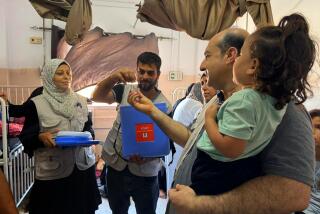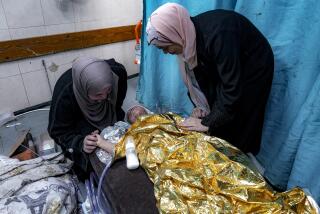AIDS: A GLOBAL ASSESSMENT : MIDDLE EAST : Clash Over Religious Beliefs
- Share via
For more than six months, Samia, a young Cairo secretary, lived with a terrible fear that she dared not share with anyone. Samia thought she had AIDS.
Although she had done nothing that could have exposed her to the AIDS virus, Samia had worked briefly the previous year as a research assistant to an American university professor whose male lover had died of AIDS in Cairo. The professor subsequently left Egypt.
“The next six months were hell,” Samia confided later, on condition that her real name not be used. “I was afraid I might have gotten AIDS just by being in the same room with him. I couldn’t tell anyone. I couldn’t even ask my family doctor; I was so ashamed.”
Samia began to lose weight and become haggard and fatigued. Her psychosomatic symptoms, which also matched early signs of AIDS, only reinforced her fears. Finally, when she could stand the growing anxiety no longer, Samia took a blood test. It was negative.
“I felt so relieved. I felt like someone had taken a great burden from me,” Samia said. “I guess I was pretty dumb, but all my friends would have reacted the same way.”
Samia’s shame--underlined by the fact that even now she will talk about her experience only if her identity is protected--illustrates an attitude toward AIDS prevalent throughout Arab society.
Blinkered by sexual taboos and the temptation to engage in anti-Western propaganda, Arab nations have no clear vision of the debate over AIDS, despite the fact that it is, in the words of one Egyptian doctor, “a serious problem that is growing worse by the day in this part of the world.”
In contrast, AIDS in Israel is the subject of great scientific scrutiny, intense national debate and the target of a growing public education campaign.
So far, Israel has confirmed 45 AIDS cases, including 33 deaths, among a population of 4.3 million, a very low national rate. Between 1,000 to 1,500 people are estimated to be infected with the AIDS virus, according to Dr. Abraham Morag of Hadassah Hebrew University Medical Center in Jerusalem, chairman of a Health Ministry subcommittee on AIDS information and education. About 40% are believed to be hemophiliacs, and almost all the rest are homosexual men or intravenous drug addicts.
Similar statistics in Arab nations are extremely hard to come by. The only cases that are ever mentioned in the press are those involving foreigners or Arabs who became infected with the AIDS virus through “innocent” means such as blood transfusions.
In Arab nations, AIDS is still perceived as an almost exclusively homosexual disease. And while homosexuality exists throughout the Arab world, so strong is the stigma attached to it that even doctors at a recent medical symposium in Kuwait could not bring themselves to talk openly and publicly about AIDS.
As a result of this stigma, the official AIDS statistics--including 14 confirmed AIDS cases in Egypt, nine in Qatar, and seven in Lebanon--are probably more indicative of the ability and willingness of countries to acknowledge the presence of the disease than the actual number of cases.
With sex education largely taboo in Arab nations, prevention efforts have focused on trying to minimize the possible introduction of the virus by the hundreds of thousands of expatriate Asians, Africans, Europeans and Americans who work in the region. Screening of blood donors is beginning as well, but on a haphazard basis.
Iraq, for example, requires mandatory AIDS virus blood tests for all foreigners who wish to stay in the country for more than two weeks. Those who fail to report for testing risk fines and imprisonment.
Many other Arab countries, including Kuwait, Saudi Arabia and the United Arab Emirates, require that foreign workers take blood tests to prove that they are not infected. Foreigners who test positive for the AIDS virus or develop AIDS-related symptoms are usually quietly but quickly expelled.
“AIDS is not nearly as big a problem in the Arab world as it is in the West or in Africa--at least not yet,” one Egyptian doctor said. “But it is still a problem, and one that it is likely to grow worse the more we insist on closing our eyes to it.”
Israel, on the other hand, has made disproportionate strides on the scientific and technical end of the battle against AIDS, although there are sharp disagreements within the country about whether enough is being done for the educational and social dimensions of the problem.
Israeli scientists are credited with developing the experimental AIDS drugs AL-721 and AS101, which are being tested in the United States. They also introduced heat treatments in 1984 to decontaminate imported blood clotting factors used to treat hemophiliacs.
All blood donations are screened for AIDS antibodies, and Israelis can obtain anonymous blood tests at seven centers throughout the country.
But critics contend that the government has fallen down in making the general public aware of the dangers of sexual transmission of the virus while at the same time calming unjustified fears of casual contact with AIDS patients. Earlier last month, for example, a building in Jaffa, near Tel Aviv, that was supposed to serve as an AIDS patients’ clinic was vandalized by fire and graffiti.
“They did the right thing in terms of blood and testing centers, and then they stopped,” said Joanna Yehiel, a Jerusalem Post editor who has just finished a book on AIDS titled “The Eleventh Plague.”
Yehiel, who became something of a lay expert on the subject after writing a series of articles on AIDS a year ago, added, “They hope to be in the forefront of the medical breakthroughs and in the background when it comes to AIDS victims.
“In the meantime, people are being infected. They haven’t changed their behavior at all as far as I can see. When the (U.S.) 6th Fleet comes, in all the prostitutes still flock to Haifa.” (Haifa is the northern Israeli port where the U.S. Navy frequently docks and its men take shore leave).
The socialized health service has launched a modest AIDS educational campaign, including an AIDS brochure and planned television and radio commercials. The campaign is “not very aggressive,” according to Morag of Hadassah Hebrew University. “We don’t think from the condition of the country today it’s justified to raise hell about the problem and cause panic.”
As in Arab nations, sex education is difficult in Israel because it raises sensitive religious issues. To a large segment of the population--those who are the most deeply observant--it is a violation of God’s law to use a condom because it is a birth control device. Withdrawal is still the basic means of preventing pregnancy.
But Israel is about to markedly expand its AIDS education efforts, in large part through a Big Brother-type program called Flower in which about 300 medical students will voluntarily provide health education in secondary schools throughout the country.
The brainchild of third-year medical student Inon Schenker, Flower was tried experimentally in a handful of schools last year and will be taught to about 75% of Israeli students between the ages of 12 and 18 next year.
The program deals with AIDS in the context of a series of lectures on the immune system, followed by discussions of how AIDS is transmitted and safe sex practices. In the last class, older students are shown a condom and told how to use it.
AIDS IN MIDDLE EAST Eastern Mediterranean region . . 18 Egypt . . 14 Israel . . 45 Jordan . . 2 Lebanon . . 7 Qatar . . 9 Saudi Arabia . . 2 Tunisia . . 4 Turkey . . 19 TOTAL CASES . . 120
More to Read
Sign up for Essential California
The most important California stories and recommendations in your inbox every morning.
You may occasionally receive promotional content from the Los Angeles Times.













